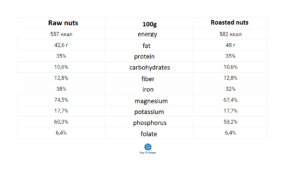Raw vs roasted nuts How best to consume them?
Nuts more stable return to the menu of people starting to recognize them as a valuable source of nutrients. Many of us consume them because of the healthy fat and they contain protein. They are wonderful and practical solution to the problem of modern man nutrition during hectic schedule.
Many of us, however, are confused and are not sure what to choose as more useful and easier digestion, raw or roasted nuts. Both of consumption have their advantages and disadvantages. We will not dwell on the many benefits of their consumption, and will celebrate their real and potential disadvantages for everyone to make their conclusions.
From the viewpoint of maintaining the nutrient raw nuts are known, although a small advantage can be seen in the comparative table (which represents average values relevant for most species):
The values marked with percentages are against the recommended daily dose, based on 2000 cal
Roasted nuts
Nutrients – nuts, which will most often buy commercially available are fried in fat and salt. Although as energy values the difference is minimal, it would be a good idea to bake them yourself, if track the quality of the fat you eat. Table salt is another reason to prefer home roasting nuts in the sea or other type of natural salt.
The content of acrylamide is another potential drawback of roasted nuts. It is a byproduct of aspartic acid, and is formed by baking almond and hazelnut, and the processing of nuts in fat. It acts as a neurotoxin and releases excess free radicals have carcinogenic effects and can cause changes in the chromosomes.
Raw nuts
Phytic acid – raw nuts that are not pre-dried or soaked in water may contain substances that make them potentially dangerous. Nuts and seeds contain enzymes and other substances that protect them from being eaten by insects.
Furthermore, the protection of the kernels, however, phytic acid can block the absorption of calcium, magnesium, iron and zinc. Soaking and drying eliminate the phytic acid content. Systemic consumption of fresh nuts and seeds can lead to serious nutritional nedoimatsi in the body.
Although rare, in raw nuts can contain harmful bacteria to the body. There are cases of contamination with salmonella from almonds. Peanuts (we include them here because although representative of legumes, they are most often consumed as nuts) can also become the successor of salmonella and aflatoxin.
Roasting, blanching and even slight Steamers destroy salmonella. Roasting removes up to 50% of aflatoxins. Additional security measure is the removal of discoloration during cooking nuts.
Additional tips
The reason many people prefer roasted nuts taste them. When baking is released fatty acids which our tastebuds react. And roasted and raw nuts have their benefits and potential hazards. Choice about what kind to consume relies mostly to our taste preferences. Whether you use them raw or roasted, however, always choose quality and fresh products.
If you love them baked, bake them yourself. Bake them at 175 degrees for no more than 7-9 minutes, always pre-heat the oven. You can slightly moisten them and rolled in salt, spice them or bake them in a little oil (use coconut, rice or other high temperature resistant fat).
If your raw nuts are tasteless, add some salt to the water in which they soak. After you soak them, you can keep them for a long time, making them dehydrated for about 12 hours at 40 degrees
Choose nuts, whose integrity is not compromised and no discoloration. Avoid those with cobwebs and mold on them.
Keep nuts properly, do not let it linger, but at the first sign of rancidity remove them.
Do not overdo the quantity. Remember that only the quantity makes the difference between medicine and poison. Eat smart, so enjoy the beneficial effects of nuts and seeds.

